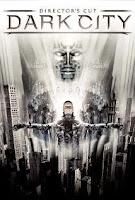Dark
City (Directed by Alex Proyas)/1998
Dark
City is an interesting reflection on the future of humanity or rather future
humanity.
Spoiler
Alert: The story entails a future species that are super intelligent to the
point where they have little dependence on physical existence. They can alter the physical realm by
thought or will alone. However
their civilization is in decline and they think that the human ability to live
as a separate individual is secret to their survival.
The
future beings look very similar to humans but they are sexless and hairless.
They seem very evil and vampire-ish and they are disgusted by the crudeness of
humanity. They turn Earth into a
giant experiment space and enslave the current humanity in a time warp of
constant darkness where they put everyone to sleep each day at midnight and
change around people’s memories. The result is that we’re living a different
life everyday thinking that we’ve lived a certain life all along. While there is a slight Matrix feel to
this, the issue is a bit closer to home as we’re not enslaved by aliens but the
future of humanity.
I
would argue that the portrayal of the future human species in this film is
symbolic of the collective subconscious guilt towards future civilization and
the self-hate at not being able to sort our selves out.
It
doesn’t take watching Aljazeera to know that humanity is bleak: constant wars,
famine, exploitation, and climate change.
As an individual living in a developed Western society we have the
luxury of living in peace and to help out. We can consider: donating towards
the latest natural disaster, supporting a child, gifting a goat, buying fair trade goods, reducing carbon foot print, buying ethical clothing, not using plastics, growing your own vegetables, worm farming,
and on and on.
For
a discerning consumer of ideas and goods it can be confusing and anxious
figuring out whether you’re “doing the right thing” for the Earth and the
future generations. The future species in the film discover that despite people
having adopted (someone else’s) memories people always carry a certain
“individuality”. Therefore even if
we’re instilled certain rules and values, there is something innate in
ourselves that makes us unique.
The irony is that our precious “individuality” clashes with the common
good and we don’t always do what is right. Sometimes we just want to do something that is most
appealing to us and we feel guilty for it.
All
this individuality clashing with self-imposed moral responsibility (that does
not result in any short-term physical or psychological pleasure) grows to
become a huge burden, particularly in a highly individualized society like ours.
Certain
activities for “changing the world“ require quite a bit of deviation from your
9-5-office-and-back-to-the-apartment lifestyle: you can only do so much. I think the result of this is the
growing feeling of resentment and guilt as a collective towards the future
species. We resent the way that
our lives are dictated by the needs of the future species and feel guilty that
we’re not doing enough. This film
is a masochistic expression of this collective subconscious: we’re being
punished and enslaved by the future species and we think we deserve it.
The
tragic thing about this film is that even when people are at last saved they
are not aware they have been freed because they simply went on to live with the
memory they were last given. People didn’t realize what was missing so when it
was returned they didn’t rejoice. This is the paradox central to the imperative
to live with a concern for the future of our species.
